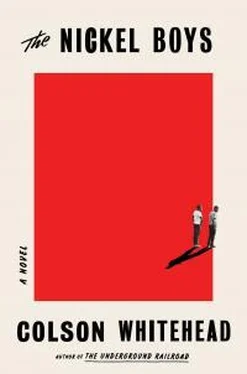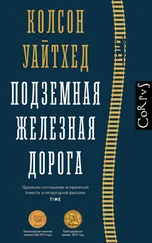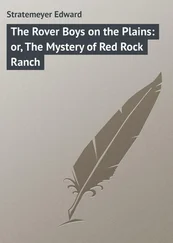Колсон Уайтхед - The Nickel Boys
Здесь есть возможность читать онлайн «Колсон Уайтхед - The Nickel Boys» весь текст электронной книги совершенно бесплатно (целиком полную версию без сокращений). В некоторых случаях можно слушать аудио, скачать через торрент в формате fb2 и присутствует краткое содержание. Год выпуска: 2019, Издательство: Penguin Random House LLC, Жанр: roman, на английском языке. Описание произведения, (предисловие) а так же отзывы посетителей доступны на портале библиотеки ЛибКат.
- Название:The Nickel Boys
- Автор:
- Издательство:Penguin Random House LLC
- Жанр:
- Год:2019
- ISBN:нет данных
- Рейтинг книги:4 / 5. Голосов: 1
-
Избранное:Добавить в избранное
- Отзывы:
-
Ваша оценка:
- 80
- 1
- 2
- 3
- 4
- 5
The Nickel Boys: краткое содержание, описание и аннотация
Предлагаем к чтению аннотацию, описание, краткое содержание или предисловие (зависит от того, что написал сам автор книги «The Nickel Boys»). Если вы не нашли необходимую информацию о книге — напишите в комментариях, мы постараемся отыскать её.
), that the world began to care.
The Nickel Boys — читать онлайн бесплатно полную книгу (весь текст) целиком
Ниже представлен текст книги, разбитый по страницам. Система сохранения места последней прочитанной страницы, позволяет с удобством читать онлайн бесплатно книгу «The Nickel Boys», без необходимости каждый раз заново искать на чём Вы остановились. Поставьте закладку, и сможете в любой момент перейти на страницу, на которой закончили чтение.
Интервал:
Закладка:
Later that afternoon as he chased a fat, buzzing fly around the store, Elwood thought there probably weren’t a lot of white kids in Tallahassee who studied at the college level. He who gets behind in a race must forever remain behind or run faster than the man in front.
Harriet expressed no misgivings over Mr. Hill’s offer—the word free was a master switch. After that, Elwood’s summer moved as slow as a mud turtle. Because Mr. Hill’s friend taught English, he thought he had to sign up for a literature course, but even when he found out he could take anything he wanted, he stuck with it. The survey course on British writers wasn’t practical, as his grandmother pointed out, but that was its charm, the more he thought about it. He had been exceedingly practical for a long time.
Perhaps the textbooks at the college might be new. Unscarred. Nothing to cross out. It was possible.
The day before Elwood’s first college class, Mr. Marconi summoned him to the cash register. Elwood had to miss his Thursday shifts in order to attend; he assumed his boss wanted to make sure things were in order for his absence. The Italian cleared his throat and pushed a velvet case to him. “For your education,” he said.
It was a midnight-blue fountain pen with brass trim. A nice gift, even if Mr. Marconi got a discount because the stationers were a steady client. They shook hands in a manly fashion.
Harriet wished him good luck. She checked his school outfit every morning to make sure he was presentable, but apart from plucking the occasional piece of lint never made any corrections. This day was no different. “You look smart, El,” she said. She kissed him on the cheek before heading to the bus stop, hunching her shoulders in the way she did when she was trying not to cry in front of him.
Elwood had plenty of time after school to get to the college, but he was so eager to see Melvin Griggs for the first time that he set out early. Two rivets in his bike chain broke the night he got that black eye, and ever since it tended to snap when he took it out for long rides. He’d stick out his thumb or walk the seven miles. Step through the gates and explore the campus, get lost in all those buildings, or just sit on a bench off the quadrangle and breathe it in.
He waited at the corner of Old Bainbridge for a colored driver who headed for the state road. Two pickups passed him by and then a brilliant-green ’61 Plymouth Fury slowed, low and finned like a giant catfish. The driver leaned over and opened the passenger door. “Going south,” he said. The green-and-white vinyl seats squeaked when Elwood slid inside.
“Rodney,” the man said. Rodney had a sprawling but solid physique, like a Negro version of Edward G. Robinson. His gray-and-purple pinstripe suit completed the costume. When Rodney shook his hand, the rings on his fingers bit and made Elwood wince.
“Elwood.” He put his satchel between his legs and looked over the space-age dashboard of the Plymouth, all the push buttons sticking out of the silver detailing.
They headed south toward County Road 636. Rodney tapped vainly at the radio. “This always gives me trouble. You try it.” Elwood stabbed the buttons and found an R&B station. He almost turned the channel, but Harriet wasn’t here to cluck over the double meanings in the lyrics, her explanations of which always left him mystified and dubious. He let the station sit, it was a doo-wop group. Rodney wore the same hair tonic as Mr. Marconi. The air in the car was acrid and heavy with the stuff. Even on his day off, he couldn’t rid himself of it.
Rodney was on his way back from seeing his mother, who lived in Valdosta. He said he hadn’t heard of Melvin Griggs before, putting a dent in Elwood’s pride over his big day. “College,” Rodney said. He whistled through his teeth. “I started working in a chair factory when I was fourteen,” he added.
“I have a job in a tobacco store,” Elwood said.
“I’m sure you do,” Rodney said.
The disc jockey rattled off the information for the Sunday swap meet. A commercial for Fun Town came on and Elwood hummed along.
“What’s this?” Rodney said. He exhaled loudly and cursed. Ran his hand over his conk.
The red light of the prowl car spun in the rearview mirror.
They were in the country and there were no other cars. Rodney muttered and pulled over. Elwood put his satchel in his lap and Rodney told him to keep cool.
The white deputy parked a few yards behind them. He put his left hand on his holster and walked up. He took off his sunglasses and put them in his chest pocket.
Rodney said, “You don’t know me, do you?”
“No,” Elwood said.
“I’ll tell him that.”
The deputy had his gun out now. “First thing I thought when they said to keep an eye out for a Plymouth,” he said. “Only a nigger’d steal that.”
PARTTwo
CHAPTER FOUR
After the judge ordered him to Nickel, Elwood had three last nights at home. The state car arrived at seven o’clock Tuesday morning. The officer of the court was a good old boy with a meaty backwoods beard and a hungover wobble to his step. He’d outgrown his shirt and the pressure against the buttons made him look upholstered. But he was a white man with a pistol so despite his dishevelment he sent a vibration. Along the street men watched from porches and smoked and gripped the railings as if afraid of falling overboard. The neighbors peeked through their windows for a view, connecting the scene to events from years before, when a boy or a man was taken away and he was not someone who lived across the street but kin. Brother, son.
The officer tossed a toothpick around in his mouth when he talked, which was not often. He handcuffed Elwood to a metal bar that ran behind the front seat and didn’t speak for two hundred and seventy-five miles.
They got down to Tampa and five minutes later the officer was in a fight with the clerk at the jail. There had been a mistake: All three boys were headed for the Nickel Academy, and the colored boy was supposed to be picked up last, not first. Tallahassee was only an hour away from the school after all. Didn’t he think it strange that he was driving the boy up and down the state like a yo-yo, the clerk asked? At this point his face was red.
“I just read what’s on the paper,” the officer said.
“It’s alphabetical,” the clerk said.
Elwood rubbed at the mark the cuffs cut into his wrists and could have sworn the bench in the waiting room was a church pew, it was the same shape.
Half an hour later they were on the road again. Franklin T. and Bill Y.: alphabetically distant and temperamentally even farther. Elwood took the two white boys next to him for rough characters from the first scowl. Franklin T. had the most freckled face he’d ever seen, with a deep suntan and crew-cut red hair. He had a downcast look, head sunk, staring at his toes, but when he lifted his eyes to other people they were invariably vesseled with fury. Bill Y.’s eyes, for their part, had been punched black, purple, and lurid. His lips were puffed and scabbed. The brown, pear-shaped birthmark on his right cheek added another hue to his mottled face. He snorted when he got a look at Elwood, and whenever their legs touched on the drive, Bill pulled back as if he’d leaned against a hot chimney stove.
Whatever their life stories, whatever they’d done to get sent to Nickel, the boys were chained together in the same fashion and headed to the same destination. Franklin and Bill exchanged notes after a while. This was Franklin’s second visit to Nickel. The first time was for being recalcitrant; he was back for truancy. He got a licking for eyeballing the wife of one of the house fathers, but other than that the place was decent, he supposed. Away from his stepfather at least. Bill was being raised by his sister and fell in with a bunch of bad apples, as the judge put it. They broke the front window of a pharmacy, but Bill got off easy. He was going to Nickel because he was only fourteen, while the rest were heading up to Piedmont.
Читать дальшеИнтервал:
Закладка:
Похожие книги на «The Nickel Boys»
Представляем Вашему вниманию похожие книги на «The Nickel Boys» списком для выбора. Мы отобрали схожую по названию и смыслу литературу в надежде предоставить читателям больше вариантов отыскать новые, интересные, ещё непрочитанные произведения.
Обсуждение, отзывы о книге «The Nickel Boys» и просто собственные мнения читателей. Оставьте ваши комментарии, напишите, что Вы думаете о произведении, его смысле или главных героях. Укажите что конкретно понравилось, а что нет, и почему Вы так считаете.

![Колсон Уайтхед - Подземная железная дорога [litres]](/books/411182/kolson-uajthed-podzemnaya-zheleznaya-doroga-litres-thumb.webp)










